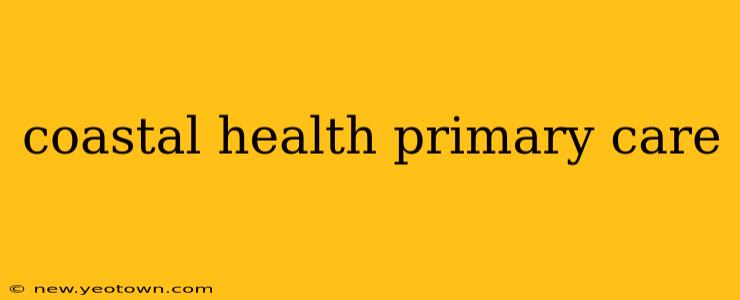The salty air, the rhythmic crash of waves, the stunning sunsets – coastal living offers a unique lifestyle. But maintaining your health in this idyllic setting requires a different approach. This isn't just about battling the occasional sunburn; it's about understanding the specific health challenges and opportunities that come with living near the coast. That's where coastal health primary care comes in. This isn't just about treating illness; it's about fostering a holistic well-being tailored to your coastal environment. Let's dive in and explore what that means.
What is Coastal Health Primary Care?
Imagine a doctor who understands the unique health concerns of coastal communities. That's the essence of coastal health primary care. It's a proactive, patient-centered approach that acknowledges the impact of the coastal environment on your health. This might include considering factors like:
- Exposure to the elements: Increased sun exposure, potential for water-related injuries, and fluctuating weather patterns all impact health.
- Lifestyle factors: Coastal communities often have unique recreational activities (surfing, boating, fishing) that bring their own set of risks and benefits.
- Access to healthcare: The geographical distribution of healthcare facilities can present unique challenges in coastal areas.
- Environmental concerns: Exposure to pollutants or specific toxins found in coastal environments.
What are the common health concerns in coastal areas?
Coastal living, while picturesque, brings unique health challenges. Let's explore some of the most prevalent concerns.
Skin Cancer: Increased sun exposure is a significant risk factor for skin cancer. Coastal communities often have higher rates of skin cancer due to prolonged sun exposure during recreational activities.
Water-related injuries: Swimming, boating, and other water sports can lead to injuries, drownings, and infections. Proper safety precautions and awareness are crucial.
Respiratory Issues: Exposure to sea spray, pollen, and air pollutants can trigger or exacerbate respiratory conditions like asthma and allergies.
Infectious Diseases: Exposure to contaminated water or seafood can lead to various infections.
Mental Health: While the coastal environment is often associated with relaxation, isolation and economic pressures in certain coastal communities can negatively impact mental well-being.
How does coastal primary care differ from traditional primary care?
Coastal health primary care takes a more holistic view, incorporating the environmental context into its approach. It's about understanding the specific risks and opportunities presented by coastal living and tailoring care accordingly. This could include:
- Enhanced sun safety education: Providing detailed information and resources on sun protection.
- Water safety programs: Promoting safe practices for water-related activities.
- Environmental health assessments: Evaluating the impact of environmental factors on individual health.
- Access to specialized care: Ensuring patients have access to necessary specialists, even in remote locations.
What are the benefits of choosing coastal health primary care?
The benefits extend beyond just addressing health concerns; they encompass a comprehensive approach to well-being:
- Proactive care: Focusing on prevention and early detection of health issues.
- Personalized care: Tailoring treatment plans to individual needs and the coastal environment.
- Improved access: Bridging the gap in healthcare access in remote coastal communities.
- Enhanced community health: Promoting the overall well-being of coastal communities.
Where can I find coastal health primary care services?
Unfortunately, there isn't a universally recognized "coastal health primary care" designation. However, the best approach is to seek out primary care providers in your coastal community who are familiar with the local environment and the specific health challenges faced by residents. Look for providers who emphasize preventative care and are knowledgeable about environmental health risks.
Living by the coast is a privilege, but it demands a proactive approach to health. By understanding the specific challenges and choosing a healthcare provider who understands the coastal environment, you can enjoy the best of both worlds: a vibrant coastal lifestyle and optimal well-being.

